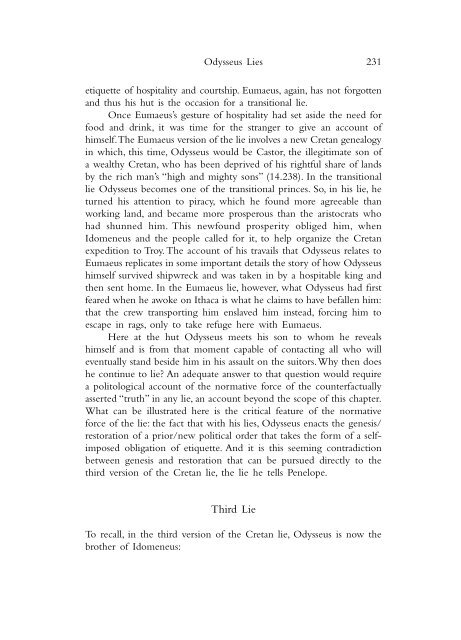Create successful ePaper yourself
Turn your PDF publications into a flip-book with our unique Google optimized e-Paper software.
Odysseus Lies<br />
231<br />
etiquette <strong>of</strong> hospitality and courtship. Eumaeus, again, has not forgotten<br />
and thus his hut is <strong>the</strong> occasion for a transitional lie.<br />
Once Eumaeus’s gesture <strong>of</strong> hospitality had set aside <strong>the</strong> need for<br />
food and drink, it was time for <strong>the</strong> stranger to give an account <strong>of</strong><br />
himself. The Eumaeus version <strong>of</strong> <strong>the</strong> lie involves a new Cretan genealogy<br />
in which, this time, Odysseus would be Castor, <strong>the</strong> illegitimate son <strong>of</strong><br />
a wealthy Cretan, who has been deprived <strong>of</strong> his rightful share <strong>of</strong> lands<br />
by <strong>the</strong> rich man’s “high and mighty sons” (14.238). In <strong>the</strong> transitional<br />
lie Odysseus becomes one <strong>of</strong> <strong>the</strong> transitional princes. So, in his lie, he<br />
turned his attention to piracy, which he found more agreeable than<br />
working land, and became more prosperous than <strong>the</strong> aristocrats who<br />
had shunned him. This newfound prosperity obliged him, when<br />
Idomeneus and <strong>the</strong> people called for it, to help organize <strong>the</strong> Cretan<br />
expedition to Troy. The account <strong>of</strong> his travails that Odysseus relates to<br />
Eumaeus replicates in some important details <strong>the</strong> story <strong>of</strong> how Odysseus<br />
himself survived shipwreck and was taken in by a hospitable king and<br />
<strong>the</strong>n sent home. In <strong>the</strong> Eumaeus lie, however, what Odysseus had first<br />
feared when he awoke on Ithaca is what he claims to have befallen him:<br />
that <strong>the</strong> crew transporting him enslaved him instead, forcing him to<br />
escape in rags, only to take refuge here with Eumaeus.<br />
Here at <strong>the</strong> hut Odysseus meets his son to whom he reveals<br />
himself and is from that moment capable <strong>of</strong> contacting all who will<br />
eventually stand beside him in his assault on <strong>the</strong> suitors. Why <strong>the</strong>n does<br />
he continue to lie? An adequate answer to that question would require<br />
a politological account <strong>of</strong> <strong>the</strong> normative force <strong>of</strong> <strong>the</strong> counterfactually<br />
asserted “truth” in any lie, an account beyond <strong>the</strong> scope <strong>of</strong> this chapter.<br />
What can be illustrated here is <strong>the</strong> critical feature <strong>of</strong> <strong>the</strong> normative<br />
force <strong>of</strong> <strong>the</strong> lie: <strong>the</strong> fact that with his lies, Odysseus enacts <strong>the</strong> genesis/<br />
restoration <strong>of</strong> a prior/new political order that takes <strong>the</strong> form <strong>of</strong> a selfimposed<br />
obligation <strong>of</strong> etiquette. And it is this seeming contradiction<br />
between genesis and restoration that can be pursued directly to <strong>the</strong><br />
third version <strong>of</strong> <strong>the</strong> Cretan lie, <strong>the</strong> lie he tells Penelope.<br />
Third Lie<br />
To recall, in <strong>the</strong> third version <strong>of</strong> <strong>the</strong> Cretan lie, Odysseus is now <strong>the</strong><br />
bro<strong>the</strong>r <strong>of</strong> Idomeneus:
















